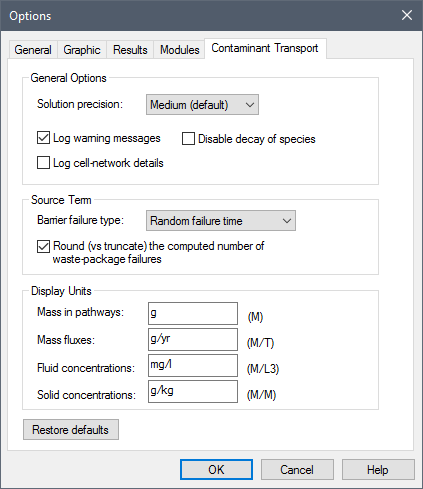External pathways produce the following outputs:
- value(s) for the user-defined output arguments; and
- the mass flux of each species The chemical (or non-chemical, such as bacterial or viral) constituents that are stored and transported through an environmental system in a contaminant transport model. In GoldSim, the Species element defines all of the contaminant species being simulated (and their properties). for all specified advective Outflows.
The types and dimensions An output attribute for an element that defines the dimensionality (in terms of Length, Time and other fundamental dimensions) of the output. of the user-defined outputs are specified by the user when they are created. The flux outputs are vectors by species with dimensions of mass/time.
You specify that you wish to save these results in two different places:
- All user-defined outputs
are saved by clicking Final Values and/or Time History at the
bottom of the External pathway A transport pathway element that provides a mechanism by which external program modules for contaminant transport (e.g., analytical, finite elelement, or finite difference models) can be directly integrated into GoldSim. editing
dialog:

Checking one of these causes all user-defined output arguments to be saved. If you wish to save only one or two of these as results, you can use the context menu of the output (accessed via a right-click) in the browser An alternative view of a GoldSim model, in which elements are displayed in a tree, and organized either hierarchically, or by type. to turn on or off a particular output. In this case, the checkbox in the dialog would become gray (indicating that some of the results will be saved). The display units The units (e.g., m, g, $/day) in which an output is displayed within GoldSim. for these outputs are defined when the output is created.
As discussed below, if your user-defined outputs are arrays and you are running multiple realizations, time histories are only saved if the output is linked to a Time History Result element. - Fluxes are saved by
selecting a mass flux link An interconnnection between two transport pathways that defines the rate at which species move between the pathways. in the Inflows
or Outflows tab for a linked pathway and clicking Save Final
Values and/or Save Time History at the bottom of the
dialog:

If you are running multiple realizations, the Time History box is ignored, and unless an output of the element is connected to a Time History Result element, no time history results will be saved at all for the element. In fact, in such a case, the Save Results section would look like this:

In this particular case, because the simulation involves multiple realizations, the "Time History" checkbox is replaced by a "Monte Carlo Histories" checkbox. This checkbox is grayed out, since it is only used for information purposes. You cannot edit it directly, and its appearance is completely determined by whether or not the output is connected to a Time History Result element. That is, in order to save time history results for an External output when running multiple realizations, you must connect it to a Time History Result element A Result element that shows the history of a particular output as a function of time..
The display units for masses, concentrations and fluxes for all pathways are specified in the Contaminant Transport tab of the Options dialog (accessed via Model | Options... from the main menu):

- Defining External Pathway Properties
- External Pathway Example
- External Pathway Outputs
- Features and Capabilities of External Pathways
- Flux Links to/from External Pathways
- General Information Flow to and from an External Pathway
- Passing Mass Flux Data Between GoldSim and the External Pathway Function
- Saving Results for an External Pathway
- Viewing an External Pathway in the Browser